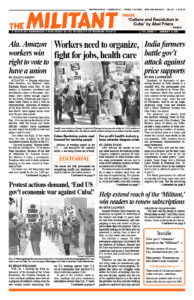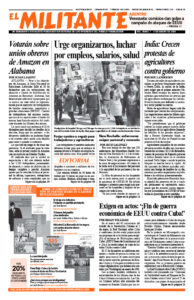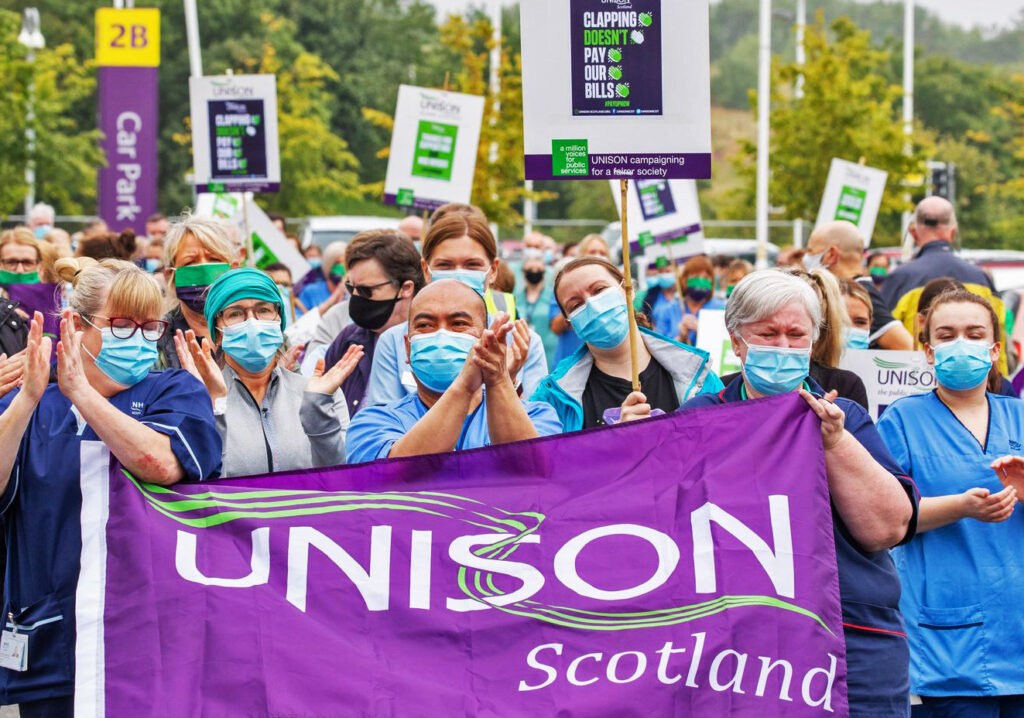GLASGOW, Scotland — Opposition parties turned on U.K. Prime Minister Boris Johnson after he told a Conservative Party meeting that the devolution of political powers from London to an assembly in Scotland had been a “disaster” and the “biggest mistake” of former Prime Minister Tony Blair.
Scottish National Party spokesperson Drew Henry said Johnson’s comments Nov. 17 show his “contempt” for people north of the border. They come as polls show rising support in Scotland for its independence from the U.K.
Mounting anger among working people in parts of the U.K. worst hit by decades of assaults on jobs and living standards drove a revival of Scottish nationalism. This fueled moves by Blair in 1999 to establish a Scottish parliament and give it powers over health, education, transport and housing. A similar assembly was set up in Wales and a year earlier in Northern Ireland. Blair’s goal was to hold the different nations that make up the U.K. together amid growing tensions, and to prevent moves toward independence.
Since then the impact on working people of the worldwide capitalist crisis that underlies these frictions has deepened. The U.K. rulers have also declined as a world power relative to their rivals.
In the nine months since the pandemic began the SNP’s Nicola Sturgeon, Scotland’s first minister, has presented her government as more competent than London’s, while placing blame for the economic and health disaster at Westminster’s door.
The number of COVID-19 deaths per week per head of the population in Scotland was 20% higher than in England by mid-November. Reflecting the depth of the crisis of care for the elderly during the first wave of the pandemic, 47% of all deaths from COVID-19 in Scotland were residents in nursing homes, compared to 30% in England.
Still, opinion polls show rising support for the Scottish National Party, which heads a minority Scottish government. It hopes to win a majority in elections due in May and is stepping up calls for a new referendum on Scottish independence. The U.K. rulers are determined to prevent this. They see the unraveling of the U.K. as a serious threat to their place in the world, especially as they leave the European Union and seek new trade alliances.
In 2014 a referendum in Scotland rejected the SNP’s call for independence by 55%. The Conservative and Labour parties campaigned together against it. Support for separation in that vote was not driven by a struggle by working people against discrimination or national oppression. Instead, the contest was marked by conflicts between rival capitalist parties each claiming the road to prosperity would be better achieved as part of, or independent of, the U.K.
Two years later the referendum for the U.K. to quit the EU was rejected by a 62% majority in Scotland. In the rest of the U.K. a majority voted to leave. Seizing on the outcome of that referendum, the SNP claims Scotland will flourish as a sovereign nation free of London and remain within the EU trading bloc. Tens of thousands marched here in Glasgow in January 2020, calling for Scottish independence. Johnson says the U.K. government will prevent such a referendum from being held, undercutting the rights of the Scottish people to determine their own future.
Road forward for working people
Communist League members campaigning here in November found real interest in discussing a road forward for workers.
“They say the National Health Service is open and running, it’s not,” dental nurse Marianne Kennedy told CL members. The dental practice where she works sees only a handful of patients a day compared to up to 250 before the pandemic.
The Scottish government, like its U.K. counterpart, has gutted broader health care, saying they only have resources to treat people with COVID-19. Kennedy said the government only pays her 20% of her previous wage under its furlough scheme.
CL member Pamela Holmes told Kennedy about the 400-strong protest by health workers at Edinburgh Royal Infirmary in August calling on the Scottish government to give them a pay raise.
Some 700 jobs were recently cut at the Rolls-Royce jet engine manufacturing plant in Inchinnan, a small town near Glasgow. Speaking to Andy Cowan in Inchinnan Nov. 14, this reporter described the current strike against 350 job cuts by workers at the same company’s plant in Barnoldswick, England. Cowan trains construction workers.
“That’s good,” he said on hearing about the strike. Bosses at the Barnoldswick plant had blamed the job cuts on the collapse in air travel following the pandemic. “It’s the same for my job,” Cowan said.
He has been furloughed. His bosses shelved a planned pay raise and now intend job cuts. Cowan pointed to the challenges in standing up to these attacks.
“That’s why every fight is important for us all,” I responded. “Rather than cut jobs we need to fight for a government-funded public works program to put us back to work and to build the things working people need.”
“I stopped backing the Labour Party when Jeremy Corbyn became its leader,” Cowan said. “But I don’t like the SNP either.”
“I thought the only hope for socialism was with Corbyn,” retired government worker Jim McAlister in Garthamlock, Glasgow, told CL campaigner Holmes. “Now that he’s finished it has to come through Scottish independence.”
“Key for advancing working people is not placing our reliance on parties that protect the rule of those who exploit us,” Holmes replied. “Real changes can be won through working-class struggle. Workers need to build our own party, a party of labor to help organize our struggles today and to chart a course to take political power into our own hands.”


